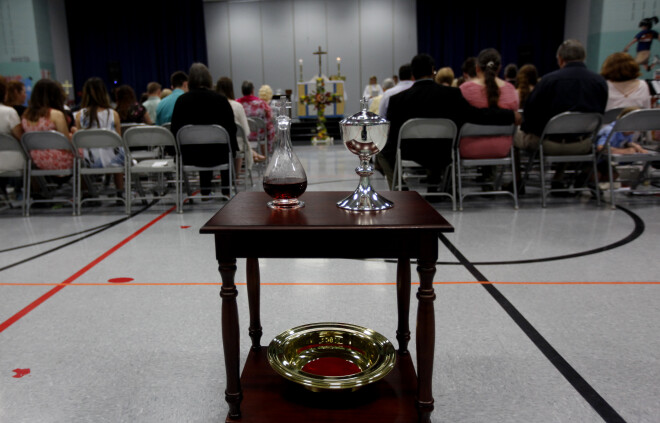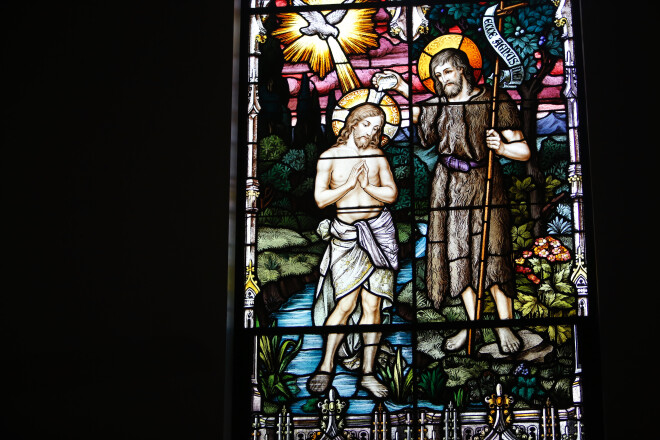New Garments, Fresh Wineskins and the Abundance of the Holy Spirit

Matthew 9:16-17
Then the disciples of John [the Baptist] came to [Jesus], saying, “Why do we and the Pharisees fast, but your disciples do not fast?” And Jesus said to them, “Can the wedding guests mourn as long as the bridegroom is with them? The days will come, when the bridegroom is taken away from them, and then they will fast. And no one puts a piece of unshrunk cloth on an old garment, for the patch tears away from the garment, and a worse tear is made. Neither is new wine put into old wineskins; if it is, the skins burst, and the wine is spilled, and the skins are destroyed; but new wine is put into fresh wineskins, and so both are preserved.” (see also Mk 2:21 and Lk 5:33-39)
What is all that about? Jesus regularly dealt with these sorts of confrontations from supposedly pious folks; and make no mistake they usually weren’t honest questions, but hostile challenges to a prophet they were discovering they couldn’t control.
I grew up the son of a Methodist pastor, which meant that I didn’t know the first thing about wine, but I certainly was acquainted with patches on my jeans. And while most of the time I may have been much more friendly towards Jesus than these Jews were, that doesn’t mean the ripped and torn jeans of my soul were quite ready for Christ to mend them overnight.
This is the lesson Jesus gets at here: readiness. He doesn’t have a beef with fasting; far from it, as we know from his temptation in the desert after his baptism. Rather he’s putting fasting in its place, along with certain hostile challengers. Disciplines such as fasting are meant not to kick-start or demonstrate genuine spirituality, but to help perfect it. They don’t produce love, they work to complete it. To fast and yet reject the way of love, to advertise one’s piety and then challenge Christ, sends a clear message: your virtue-signaling has backfired. Everyone sees you for who you are. You’ve just ripped out your pants, and your wine-skins have burst all over your friend’s new shoes… how embarrassing. Oh and by the way, congratulations, you have received your reward in full (Mt 6:16).
May the Lord have mercy and save us from such a spectacle! Knowing this, who then can be saved? It’s widely recognized that the new patch or new wine represents the new life promised through the work of Christ and the Holy Spirit; indeed, one the great early epiphanies of Jesus’ ministry occurs at the wedding in Cana, where he turned water into wine. The church has long recognized this miracle as a metaphor foreshadowing the renewing and transforming work of the Holy Spirit in the souls of those who put their trust in Christ, the epiphany of God’s power manifest within us. But in order to be ready to receive this gift we have to be prepared for its abundance.
Enter a fancy theological term: prevenient grace. That’s to say, the help of God that goes before us and prepares us for abundant new life in him. Before we’re ready to perform acts of devotion like fasting, which help open the floodgates for the outpouring of divine love in our hearts (Romans 5:5), we need to be made ready for its torrents. The difference I think lies in the nature of our hope. The Pharisees and probably some of John’s disciples fasted in hopes of earthly gain, the praise of others, afflicting the body for the carnal reward of human praise. “When you fast, do not look dismal, like the hypocrites, for they disfigure their faces that their fasting may be seen by men…” The one who fasts privately, in secret, hopes to please only her heavenly Father, who sees in secret (Mt 6:16-18).
The garment of the Christian soul is made ready for mending through faith and hope in the power of God, each born of a quiet love longing to know ever more love. The wineskin of the human heart finds itself made new and steadfast only by looking to the only one whose praise actually matters. Only the simple love of faith can contain the love of God; and only the pure of heart shall see God. Once this quiet preparatory work of the Holy Spirit begins to renew us from within, there is literally no limit to the gifts and power which can and will flow our way.
My own friendliness towards Jesus apparently hasn’t been as strong as I might have imagined when I was a youth, for I know enough now to know what wine tastes like, and to lament the fact that there isn’t nearly enough of the divine grace in me to threaten to break the wineskins of my soul. But that doesn’t mean I don’t think God will come through, and that someday I’ll be positively bursting at the seams with divine love and joy and power. Until we all are, let’s all pray with Paul, who on our behalf bowed his knees before the Father,
from whom every family in heaven and on earth is named, that according to the riches of his glory he may grant you to be strengthened with might through his Spirit in the inner man, and that Christ may dwell in your hearts through faith; that you, being rooted and grounded in love, may have power to comprehend with all the saints what is the breadth and length and height and depth, and to know the love of Christ which surpasses knowledge, that you may be filled with all the fulness of God. Now to him who by the power at work within us is able to do far more abundantly than all that we ask or think, to him be glory in the church and in Christ Jesus to all generations, for ever and ever. Amen. (Eph 3:14-21)



